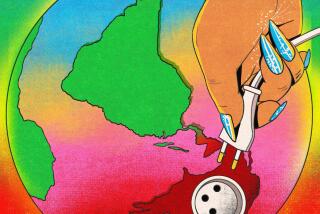Latin Americaâs Environmental Movement Seen as Well-Meaning but Inadequate
CARACAS, Venezuela â After 15 years of breakneck population and industrial growth, Latin America is taking stock of its progress in environmental protection--and it is not happy with what it sees.
Following a landmark international environmental conference in Stockholm in 1972, Latin Americans set out with high hopes of promoting growth while protecting their largely untouched resources.
Throughout the area, special government ministries and departments were created, pollution standards were approved, and millions of dollars were spent on campaigns to protect the environment.
But the results âhave not been what we would have desired,â conceded Jose Lizarraga, director of the United Nations Environmental Program for Latin America and the Caribbean.
âSimply Forgottenâ
âIn practice, environmental management lost the priority status it had been given and in some cases was simply forgotten,â Lizzaraga said in an interview. âEven while there has been a big advance in terms of consciousness-raising, there has not been such improvement in actual management.â
Lizarraga met with Latin American officials involved with environmental issues for a conference here in April to assess the regionâs progress in protecting its environment.
The officials blamed the deterioration on burgeoning urban populations and industrial growth, which Lizarraga called âpredatory and short-sighted.â
In Mexico City, now one of the largest cities in the world, too many vehicles using leaded gasoline have led to air pollution so bad that people often canât wear contact lenses.
In just two generations, Brazilâs population has changed from 70% rural to 73% urban, with sewerless shantytowns ringing major cities and an 8-million-unit housing deficit.
Influx of Immigrants
Most large Latin American cities have seen immigrants swarm in from the countryside to live in substandard housing without running water, sewage facilities, garbage disposal or paved roads.
But in terms of long-range damage, even widespread urban housing and health problems are surpassed by industrial pollution, the environmental experts said.
While pollution standards and procedures for dealing with wastes are often on the books, enforcement is lax and penalties are often painless.
In Venezuela the worst penalty for violating an environmental law is a 50,000-bolivar fine (about $3,400 at the official exchange rate) and three days in jail, according to Environment Vice Minister Carlos Barrios.
Dumped Into Rivers
Treatment of industrial effluents often is inadequate or nonexistent, and wastes are being dumped into rivers or lakes used for recreation and drinking, in violation of laws on the books.
Fertilizers, including some that are limited or banned in industrialized countries, also are being used to gain more and faster production from poor land, the environmental experts said.
In Venezuela, before a cleanup effort began in 1984, Lake Maracaibo was nearly dead from the dumping of untreated waste from industries on its shores and from Maracaibo, a city of 1 million, which until recently had no sewage treatment plant.
According to Lizarraga and others, Latin Americaâs poor record in environmental protection is mainly a political problem.
âA Short-Term Viewâ
âEnvironmental repair is more costly than prevention, even though prevention can cost more in the short term,â he said. âThe problem is that politicians have a short-term view.â
More to Read
Sign up for Essential California
The most important California stories and recommendations in your inbox every morning.
You may occasionally receive promotional content from the Los Angeles Times.










